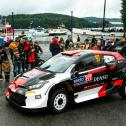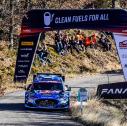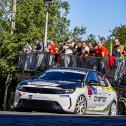Pressekontakt
ADAC e.V.
Oliver Runschke
Motorsport- und Klassik-Kommunikation
Tel.: +49 89 7676 6965
Mobil: +49 171 555 6236
E-Mail: oliver.runschke@adac.de
Kay-Oliver Langendorff
Leiter Partnerschaften, Kooperationen & Sponsoring
Leiter Kommunikation Motorsport & Klassik
Tel.: +49 (0)89-7676 6936
Mobil: +49 (0)171-555 5936
E-Mail: kay.langendorff@adac.de
27.09.2023 - Central European Rallye
World Rally Championship using non-fossil fuel and hybrid technology from Germany
- High-tech racers banking on hybrid drive systems and non-fossil fuel in the WRC
- Environmentally friendly motor racing with a mix of e-fuels and biofuels
- Comprehensive sustainability concept for the Central European Rally
The WRC is using non-fossil fuel – meaning that no mineral oil is used in its production. Manufacturer P1 has developed a complex procedure to produce the propellant from a mixture of biofuel and e-fuels. It meets the high standards required by motor racing and the specifications set by the automobile industry. A significant advantage is that teams can use the fuel without the necessity of making any modifications to the cars, as is the case with other environmentally compatible fuel variants. Second-generation biofuels are produced from organic waste, which can be an agricultural by-product, for example. This means that they are not in direct competition with food production.
Fully-electric ADAC Opel Electric Rally Cup
The Central European Rally features a fully-electric series, the ADAC Opel Electric Rally Cup. The Cup began its first season in 2021 and remains the world’s only fully-electric one-make rally cup. As the cup is based on the concept of equal opportunities, all drivers race the same type of car. The Opel Corsa Electric boasts a 136 HP electric motor, generating 260 Nm of torque. In order to save costs, the electric motor, inverter and battery unit are the same as those in the production car. However, the series does of course rely on motor racing technology in all safety-relevant areas.
Rewards for carpooling
The car fleet for the event is also electrically driven, as organisers will be charging the batteries in more than two dozen vehicles. However, in common with all major spectator events, officials will be focusing on visitor traffic as a key driver of the CO2 footprint. They are appealing to all fans to register with the ADAC Pendlernetz platform and start carpooling. Visitors can go on online at pendlernetz.de or use the free ADAC Pendlernetz app on their smartphones to arrange shared journeys to the special stages. Everyone who takes part will be doing their bit for the environment and will also be entered into an attractive prize draw: each vehicle that heads to the visitor car parking areas with at least four people on board will receive entries for that day’s prize draw corresponding to the number of people in the car.


